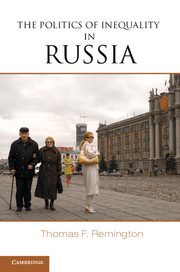Book contents
- Frontmatter
- Contents
- List of Figures
- List of Tables
- Preface
- 1 The Political Sources of Income Inequality in Russia
- 2 Employment, Earnings, and Welfare in the Russian Transition
- 3 Regime Diversity in the Russian Regions
- 4 Democracy and Inequality in the Russian Regions
- 5 Regional Regimes and the Labor Market: Evidence from the NOBUS Survey
- 6 Helping Hands or Grabbing Hands? Government-Business Relations in the Regions
- 7 Accounting for Regime Differences
- 8 After the Crash
- Index
- References
6 - Helping Hands or Grabbing Hands? Government-Business Relations in the Regions
Published online by Cambridge University Press: 05 June 2012
- Frontmatter
- Contents
- List of Figures
- List of Tables
- Preface
- 1 The Political Sources of Income Inequality in Russia
- 2 Employment, Earnings, and Welfare in the Russian Transition
- 3 Regime Diversity in the Russian Regions
- 4 Democracy and Inequality in the Russian Regions
- 5 Regional Regimes and the Labor Market: Evidence from the NOBUS Survey
- 6 Helping Hands or Grabbing Hands? Government-Business Relations in the Regions
- 7 Accounting for Regime Differences
- 8 After the Crash
- Index
- References
Summary
The preceding chapters showed that the variation in regime characteristics among Russia's regions was associated with differences in the levels and distribution of wages and incomes generally, as well as with different levels of social spending and social dependency. I argued that the pattern of business-government relations was the key to these differences. Regions ranked higher in democratic characteristics were those that had established more effective consultative relations with major enterprises. In regions with more open and transparent governments, the burden of supporting public services was spread more evenly among enterprises, while government was less predatory. Such regions saw a larger share of income paid out as wages and at the same time more spending on social support. So far, however, the evidence that business-government relations are systematically different depending on the nature of the regime has been mainly indirect. In this chapter, I examine this proposition directly.
To do so, I employ data compiled by the World Bank and the European Bank for Reconstruction and Development (EBRD) through a survey of Russian business enterprises called the Business Environment and Enterprise Performance Survey, or BEEPS. Data from this survey have been cited in a number of studies of the postcommunist region to shed light on the way the governance environment for business enterprises affects their behavior and economic performance more generally. In Russia, BEEPS surveys have been conducted in 1999, 2002, and 2005.
- Type
- Chapter
- Information
- The Politics of Inequality in Russia , pp. 152 - 171Publisher: Cambridge University PressPrint publication year: 2011



